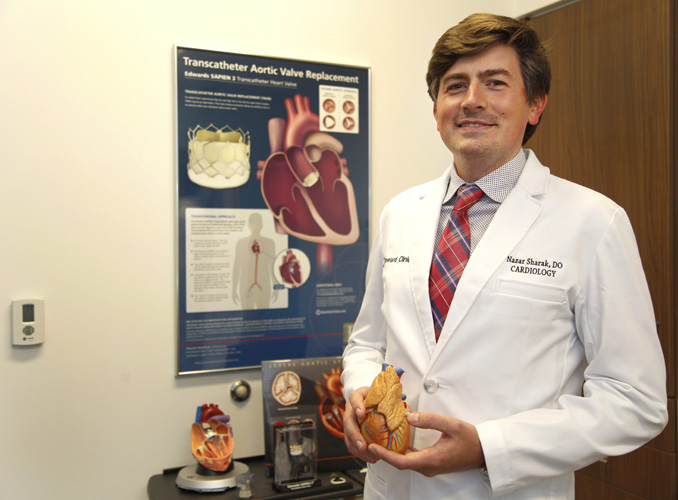
Heart failure is the No. 1 reason for hospitalization among patients old enough to receive Medicare benefits.
According to the Centers for Disease Control and Prevention, some 6.2 million Americans have heart failure. Each year 600,000 heart failure deaths are recorded in this country.
Newly arrived Cleveland Clinic Indian River Hospital cardiologist Dr. Nazar Sharak appears to take those statistics as something of a personal challenge.
“In terms of the heart failure now,” says Sharak, “there’s been a big push in research [and] new advances in therapeutics. There are new drugs that have been previously used for some other indications that now have shown some promise [in treating heart failure]. We also have new devices, where pacemakers are pacing both ventricles at the same time. That’s had a big impact.”
In fact, according to Sharak, new advances in treating heart failure are coming into the field of cardiology all the time.
So what exactly is heart failure?
While the term itself sounds downright fatalistic, it does not mean the heart has “failed” or stopped working altogether.
It actually means, according to the Mayo Clinic, “your heart muscle doesn’t pump blood as it should.”
The National Institutes of Health gives a somewhat more complete description: “Heart failure often only affects the left or right side of the heart, but can affect both. In left-sided heart failure, the left ventricle of the heart no longer pumps enough blood around the body. As a result, blood builds up in the pulmonary veins (the blood vessels that carry blood away from the lungs). This causes shortness of breath, trouble breathing or coughing – especially during physical activity. Left-sided heart failure is the most common type.
“In right-sided heart failure, the right ventricle of the heart is too weak to pump enough blood to the lungs. This causes blood to build up in the veins (the blood vessels that carry blood from the organs and tissue back to the heart). The increased pressure inside the veins can push fluid out of the veins into surrounding tissue. This leads to a build-up of fluid in the legs, or less commonly in the genital area, organs or the abdomen. Biventricular heart failure means both sides of the heart are affected. This can cause the same symptoms as both left-sided and right-sided heart failure, such as shortness of breath and a build-up of fluid.”
When asked to debunk a longstanding myth that, if heart surgery is indicated for a certain patient, the surgeon takes over entirely and that patient’s cardiologist is relegated to the sidelines, Sharak happily agrees that is no longer the case.
Today, he says, the patient’s cardiologist will meet with the surgeon and fill him or her in on the patient’s history, medications, lifestyle and such, and in a very real way becomes directly involved in the surgical process. “Absolutely,” says an energized Sharak, “I think that’s been recognized over the years and now Medicare actually mandates that.
“Before you go for any type of advanced procedure there has to be a discussion and it has to be with the patient and whoever is involved in the patient’s care, general cardiologists, conventional cardiologists and the surgeon. And there should be a group discussion where all options are on the table and every risk is discussed and the decision is made cumulatively as a group. Not just one [person] says a patient needs surgery.”
Sharak, who immigrated to the U.S. from Ukraine when he was 15 years old, grew up in Brooklyn and then went into the Army to help pay his way through college before going on to medical school because, as he puts it, “I think that medicine is the most impactful field there is.”
Finding his way to Vero Beach was probably the easiest part of his journey so far. His wife is a native Floridian with roots in Boca Raton and, says Sharak, Cleveland Clinic Indian River Hospital “stood out the most” from all the places he interviewed as “a very good group of people to work with.”
Dr. Nazar Sharak is a cardiologist with the Cleveland Clinic Indian River Hospital and is currently accepting new patients. He has offices in Vero Beach in the Health and Wellness Center at 3450 11th Court Suite 102 and at 801 Wellness Way, Suite 203 in Sebastian. The phone number is 772-778-8687.



